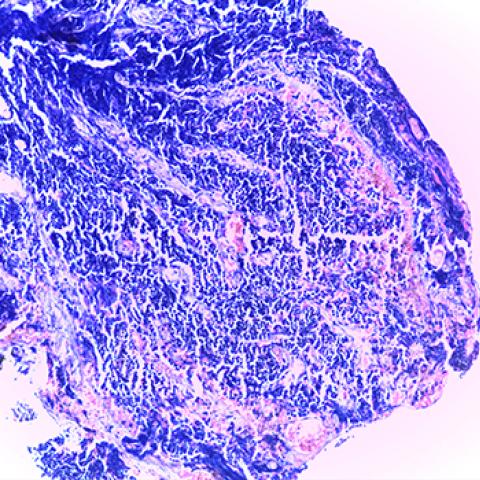
Small Cell Lung Carcinoma
Image Source: Wikimedia Commons
Patients with solid tumors or small-cell cancer in or outside the lungs may be eligible to participate in a clinical trial at the NIH Clinical Center.
Anish Thomas, MBBS, M.D., NIH Lasker Clinical Research Scholar in the Developmental Therapeutics Branch, is leading a study of a drug combination to treat solid tumors and small-cell cancers. Cells, especially cancer cells need efficient DNA repair mechanisms to maintain themselves. PARPs are an important family of proteins that are rapidly recruited to the site of DNA damage, where they initiate DNA repair. PARP inhibitors kill cells by blocking this repair process and causing DNA damage to accumulate. Several PARP inhibitors are now approved for cancers including breast, ovarian, prostate and pancreas. While PARP inhibitors can work better when combined with chemotherapy, such combinations can be too toxic. This study uses a new kind of chemotherapy called PLX038 and combines it with a PARP inhibitor rucaparib. PLX038 works specifically to damage DNA within cancer cells but is less toxic and stays in the body longer than standard chemotherapy drugs. Researchers want to see if the combination of PLX038 and rucaparib can safely shrink solid tumors and small-cell cancers.
Clinicaltrials.gov identifier: NCT04209595
NCI Protocol ID: NCI-20-C-0013
Official Title: Phase I/II Trial of PLX038 (PEGylated SN38) and Rucaparib in Solid Tumors and Small Cell Cancers.
The Center for Cancer Research is NCI’s internal cancer center, a publicly funded organization working to improve the lives of cancer patients by solving important, challenging and neglected problems in cancer research and patient care. Highly trained physician-scientists develop and carry out clinical trials to create the medicines of tomorrow treating patients at the world’s largest dedicated research hospital on the campus of the National Institutes of Health in Bethesda, Maryland.
For more information on CCR clinical trials click here, and subscribe to have the latest CCR clinical trials sent directly to your inbox.